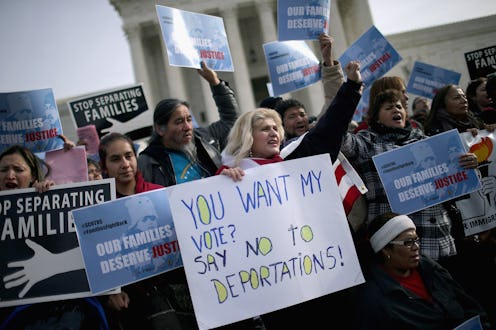News
SCOTUS Has To Uphold Obama's Immigration Action
Recent discussions of immigration policy didn't begin with Trump's wall. On Tuesday, the Supreme Court announced it will review Obama's executive action on immigration, a 2014 order that would defer deportation for up to four million undocumented immigrants in the country. The review is a response to a lawsuit devised by Texas and 25 other states claiming the president abused his power by evading Congress. What these states don't realize, however, is how great a human tragedy their win would cause.
Obama's executive action was born out of a presidency constantly at battle with Congress on immigration. The president's order called for a specific program that would temporarily protect undocumented parents of U.S. citizens from deportation. The proposed program is named the Deferred Action for Parents of Americans and Legal Permanent Residents — or DAPA, if the former isn't catchy enough for you — and it offers work permits to undocumented immigrants who meet certain criteria.
It's nothing short of imperative that the Supreme Court upholds this executive action, because it all comes down to this: the ultimate goal of this order is to keep parents united with their children. In 2012, the Pew Research Center found that 7 percent of children in grades K-12 had at least one undocumented parent. If those parents are deported, their children can suffer in "significant and long-lasting" ways, including psychological trauma and increased aggression in boys. When a child loses a parent to deportation, not only does their comprehensive support system disappear, but their access to resources decreases dramatically, according to the Migration Policy Institute.
Two weeks ago, I traveled to Tijuana, Mexico, with a class I took at my university where I had the honor of speaking with deported mothers living in Tijuana, Mexico, who have children with U.S. citizenship who they haven't seen in years. These were some of the strongest, most compassionate women I had ever met, and their stories perfectly illustrate how flawed and cruel America's immigration policies really are. I spoke with a woman — who I will keep anonymous — who was separated from her children five years ago. She said that when she was 9, her family crossed the border into the U.S., and she lived and worked in America for 40 years. She was an American if ever I saw one, but that didn't stop Immigration and Customs Enforcement (ICE) from dropping her off in Tijuana after an ex-boyfriend reported her out of spite. This woman said she had no criminal record and was detained on false charges of "terrorist threats."
I absolutely believe her, because her story is not a new one, and she's exactly the kind of person this executive order will protect. Though Obama has consistently claimed that illegal immigration policies target "criminals" and "gang bangers," a New York Times study found that between 2008 and 2014, two-thirds of the nearly two million deportation cases involved people who had committed minor infractions (like traffic violations) or had no criminal record at all. These deportations don't clean the streets of dangerous people — they break up families and punish people who dare to call our nation of immigrants "home." America needs to protect these people.
It seems a bit hypocritical that this executive action came from a president whose record is marked by mass deportations and raids on families who fled violence in Central America. It also seems pretty late in the game, but if he's anything like me, he fears the harsh immigration policies many of his potential successors are touting.
For anyone who opposes Obama's executive action, I hope you someday get a chance to visit a place called Friendship Park, or El Parque de la Amistad, as it is known in Mexico. There, the border wall disappears into the Pacific Ocean, and families separated by the border touch pinkies through tiny holes in the wall. It is there where fathers see their children for the first time, where wives and husbands exchange brief but impassioned words. The Mexican side of the wall drips with color, painted with names of deported U.S. veterans and poignant murals. "This is where dreams go to die," someone wrote on the wall in Spanish. If you go, you'll see why Obama's order is so crucial. There is simply no humanity in the separation of parent and child.
